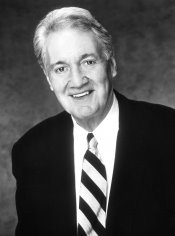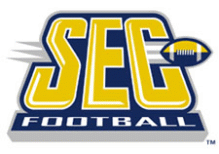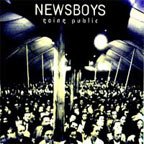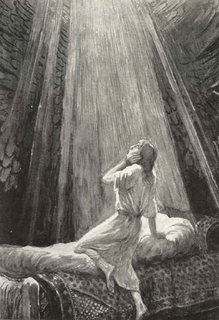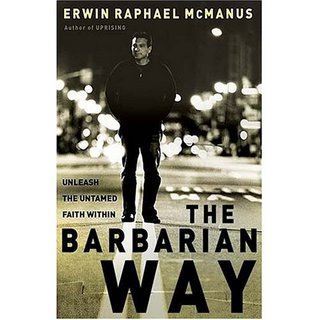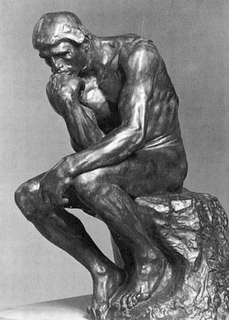Southeastern Seminary Ph.D student, Nathan Finn, was kind enough to be the first person to particpipate in the SBC Interview series. He has given some wonderfully insightful answers that we can all learn from...including some fun stuff:
1) Briefly tell us about your life before Christ became your Lord and Savior, how you came to know Christ, and how your life has been changed since Christ.
NF: I grew up in a Christian home, but the church I attended did not teach the gospel. When I was nine years old I attended a confirmation class and was immersed, but I did not understand what the Bible taught about the work Christ undertook on our behalf. I still believed that good people would go to heaven and bad people would go to hell. Naturally, I tried to be good, but all I did was become an expert hypocrite. I could talk church lingo, but I was just as rotten, lustful, cheating and self-centered as I had always been. I was still lost. When I was fourteen, my family joined a Southern Baptist church that clearly preached the gospel. I began to understand what it meant to be a Christian, though I continued to wrestle with the claims of Christ. Finally, about two weeks after I graduated from high school, I repented of my sin and believed in Christ as my Lord and Savior. Since that time, I have continued to grow in my understanding of the Christian faith. I know that I have been accepted by God, despite my sin, because Jesus paid the penalty for my sin 2000 years ago. I know that my righteousness is found in Christ, who is perfect, and that God is causing me to become more righteous, more like Christ, the longer and longer I live. Though I still sin every day, my love for Christ and his church is always growing, and I know that God is not finished with me yet. I look forward to seeing how God continues to shape my life, and the thing I want most in this world is to live my life in submission to Christ, who is my Lord.
2) You are the associate archivist at SEBTS' seminary library. Briefly tell us what that job entails.
NF: I am the primary institutional historian at our seminary, which entails a number of responsibilities. First, I serve as the curator for the seminary’s collection of historical documents. These documents include institutional material, Southern Baptist material, rare books and the personal papers of prominent Christian leaders. Second, I serve as the chief preservationist of these materials. All of these historical items must be preserved, and it is my job to make sure they are. Third, I serve as the campus’ quick-reference historian about the institution. I work with the records of our seminary’s history every day, so I know a good deal about the unique history and vision of SEBTS. Finally, I assist faculty and students with historical research, especially related to SEBTS or the SBC in general.
3) You are doing your Ph.D in church history. How did you come to the conclusion that God was calling you to study and teach in that specific area?
NF: About the same time I became a Christian, I sensed God was calling me into ministry. When I was a junior in college, God used an Old Testament professor to awaken me to the possibilities of teaching as a ministerial calling. I have always been interested in history, so once I began taking church history courses I knew I had found my niche. I have considered other fields over the years, but my strong conviction that God is providentially guiding history to a specific conclusion, all for his own glory, has always brought me back to history. The passage in Scripture that most inspires me in this calling is Galatians 4:4, which says God sent Christ to be born of Mary in “the fullness of time.” In other words, at just the right time—not a day earlier or later—God sent his Son into this world to save this world through his sinless life and atoning death. Because God is Lord of human history, I believe this “fullness of time” factor is a very real part of that history. My heart’s desire is to show students how God has worked through fallen humans, institutions, governments, doctrines and philosophies to move his creation to its final conclusion: a new heaven and a new earth, under the rule of Christ, perfect and without sin, all to his glory.
4) What/who is your dissertation about?
NF: My dissertation will focus on the ministry of John R. Rice, who was an important leader in the Fundamentalist movement of the mid-20th century. He was a tireless evangelist, publisher, author and institution-builder. He developed a large network of likeminded Fundamentalists. He experienced controversy with groups as diverse as liberal Protestants, Southern Baptists, Communists, African Americans and Billy Graham. He is an important and interesting figure, and only a handful of historians have ever looked at the enormous influence he exercised over conservative Protestants from the 1930’s to the 1970’s.
5) The old adage of history is, "those who do not learn from history are condemned to repeat it." In your opinion, what events in Church, as well as Baptist history, are so critically important that we as Southern Baptists must learn from them in order to advance God's Kingdom?
NF: Wow, that’s a great question. I think one lesson we need to learn from church history is that the church is not ultimately a power base, but the people of Christ. During the middle ages, the institutional church’s leadership was much more concerned with the degree of secular power it exercised than the spiritual nurture of its people. Though I am a political conservative, I see elements in the so-called Religious Right that seem to be wrestling with this temptation to equate the value of Christianity with the amount of power or influence it exercises in our culture. Christianity is of infinite value no matter what the Supreme Court may decide and Christ will one day rule this world no matter who wins the 2008 presidential election. A lesson from Baptist history is that our identity matters, and when that identity is compromised, our Free Church vision of the Christian life suffers. Liberal Southern Baptists began to redefine what it meant to be a Baptist between about 1880 and 1940. They interpreted Christian freedom through the lens of Enlightenment individualism. At the same time, they played down historic doctrines like believer’s baptism by immersion and regenerate church membership. So in a strange twist, you now have moderate and liberal Baptists who claim to be the “real” Baptists, but they have members in their churches who have never been baptized! Even worse, the commitment to a very individualistic idea of freedom and autonomy has led to many moderates who reject or redefine historic Christian doctrines. Baptists need to remain committed to our historic vision of the Christian life, which means looking to the time before theological progressives hijacked our denomination (and other Baptist denominations) a hundred years ago.
6) What do you think is one of the most critical issues facing Southern Baptists today?
NF: I can think of two critical issues. One is the identity issue mentioned above. Too many Baptist churches are flirting with the idea of allowing non-Baptized members to join their churches. Others are adopting hierarchical leadership styles that conflict with our historic commitment to congregationalism. Still others are functionally jettisoning the idea of regenerate church membership by not safeguarding the gospel, or baptizing three year olds, or not practicing church discipline, etc. We have become a very pragmatic denomination, and I think we need to have a renewal of “authentically” Baptist churches, even if that means rejecting popular methods like CEO-pastors, ruling elders, young childhood baptisms or gospel presentations that do not emphasize sin. A second critical issue is determining the limits of denominational cooperation. Because every Baptist church is autonomous, there is a wide variety of theological and methodological beliefs in the SBC. There are Southern Baptists who are revivalistic, Calvinist, Arminian, Charismatic, Emergent/Emerging, Willow Creek, family chapel, outreach center, open membership, Landmark and even a few moderates. Some of these practices/beliefs are acceptable and some are not. I do not pretend to know the answer, but Southern Baptists must decide what the appropriate parameters of cooperation are, or we will continue to bicker endlessly over issues like Calvinism, speaking in tongues and Emerging churches. How can we include the niches that need to be included (in my opinion) like Calvinists, Landmarkers, revivalists and some conservative Emerging types while rejecting inappropriate niches (in my opinion) like Arminians, open membership, moderates and the left-wing of the Emergent crowd?
7) You have attended both Southern and Southeastern seminaries. In your opinion, how are they different and how are they similar? Same with the professors.
NF: I get asked this question all the time. The thing to remember is that the schools are much more similar than they are different. Both schools are vigorously committed to evangelism and missions. Both schools use the Abstract of Principles and the Baptist Faith and Message 2000 as their confessions of faith. Both schools could be considered academically rigorous, though I have had very easy and very difficult professors at both schools. Both schools are generally Calvinistic, though neither school mandates a commitment to “five point” Calvinism. The biggest differences are in history/culture. Southern has a rich history. The school is almost 150 years old, and there is a strong academic tradition that has always been a part of the school’s identity. Southeastern is a younger school—less than 60 years old. Southeastern was really only a little over a generation old when the whole direction of the school radically shifted. If Southern is exciting because of its rich heritage and commitment to an historic vision, Southeastern is exciting because it has the feel of a “new” seminary that is still casting its vision for the future. The professors I had at the two schools were very comparable, especially in the theological and biblical areas.
8) Your wife is a student. My wife also graduated with an M.Div. How important do you feel is it for pastors/teachers' wives to have a grounded and solid theology and why?
NF: This is another great question. I think it is important for a minister’s wife to share in her husband’s sense of calling. Not every wife will earn a seminary degree, but all should desire to learn as much as they can about the Bible, theology and other areas of importance. In local churches, a minister’s wife has the opportunity to minister to the other women in the church, children, etc. Not every pastor’s wife will be a gifted teacher, but all need to be ready to encourage or mentor others by bringing Scripture to bear on critical issues. I think that all believer’s should be taught theology, but it is especially important for pastor’s wives to know these things so they can serve alongside their husbands and model for others what it means to think “theologically” and have a Christian worldview.
9) Who would win at Mario Kart - Dr. Mohler or Dr. Akin? Also, which driver would they choose?
NF: If they played, Dr. Mohler would win because I saw a Campus Crusade video onetime that convinced me he can win any competitive event. But they would never play because Dr. Mohler could not choose Carl F. H. Henry as his character. Dr. Akin would choose a Gumba because he’s short.
10) Who has had the biggest influence in your life in regard to your spiritual and scholastic journey?
NF: That is a great question. Theologically, the living individuals who have influenced me most are Drs. Russell Moore and Danny Akin. I have also been strongly influenced by Mark Dever’s understanding of Baptist ecclesiology. The dead theologian whom I have been most influenced by is the great English Baptist pastor/theologian Andrew Fuller. I also enjoy reading the Puritans. Scholastically/intellectually, I have been influenced by a number of historians, including Doug Weaver (a college professor), Greg Wills and Tom Nettles (SBTS) and my Ph.D. mentor, Keith Harper. I have also been strongly influenced by the writings of religious historians like George Marsden, Barry Hankins and Ernest Sandeen.
11) What is your favorite book of the Bible?
NF: John’s Gospel
12) Do you absribe to the northern or southern Galatian theory? (Just kidding)
NF: The “othern” theory.
13) If the Southern Baptist Convention fell apart over night and did not exist anymore, which denomination would you join?
NF: This is not a fair question to ask a Baptist historian! I would join another conservative Baptist denomination, of course!
14) Finally, who is going to win the SEC in football this year?
NF: I wish with all my heart it was going to be the University of Georgia. But alas, in the dark of night, my greatest fear is that the accursed University of Florida will arise Phoenix-like from the ashes and win the championship this year. It is these types of questions that cause me to thank God that he is sovereignly in control of history, even when we have trouble interpreting his good purposes in seemingly evil events!
Amen to that!

